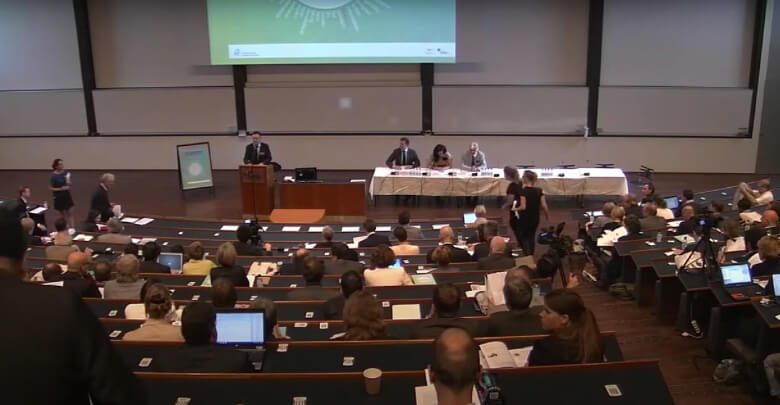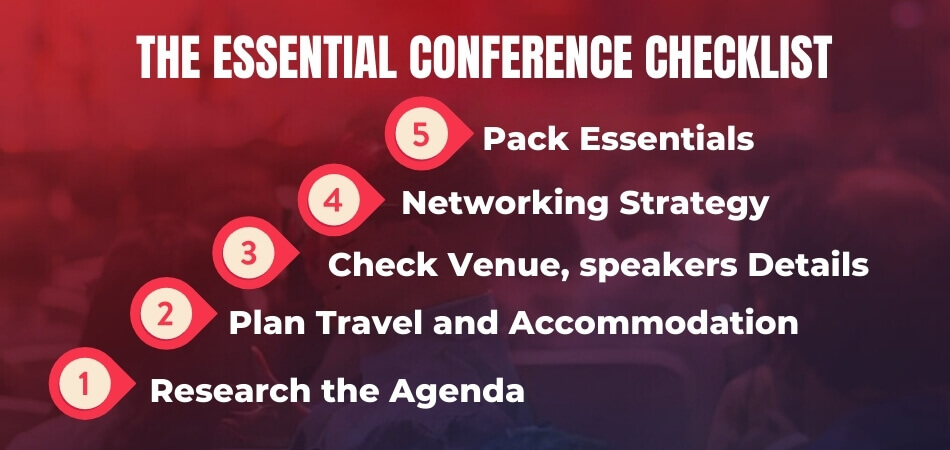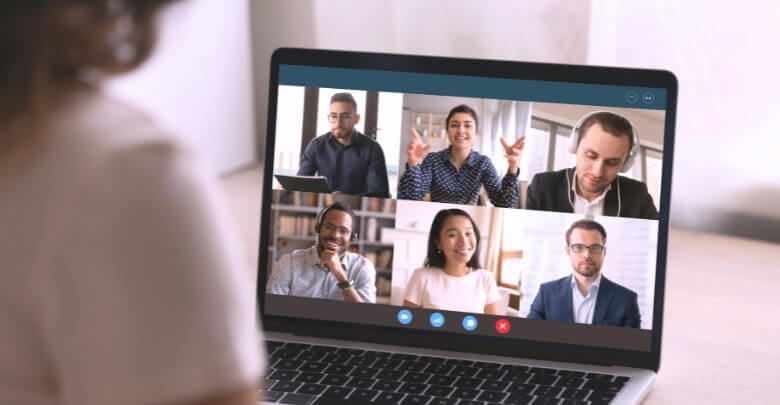Conferences can open doors to new knowledge, valuable networking opportunities, and personal growth. It’s a chance to engage with industry experts, learn about trends, and collaborate. But to truly make the most of it, preparation is key. So, what to know before going to a conference?
Before you go, it’s essential to research the conference agenda, speakers, and venue details to plan your schedule effectively. Set clear objectives, develop a networking strategy, and think of questions you’d like answered. Don’t forget to pack essentials like business cards, a notebook, and suitable attire. Be sure your travel and accommodation are planned well in advance.
Curious about maximizing your next conference experience? Continue reading this article for detailed insights into strategic preparation. You’ll find all the necessary information to ensure your conference experience is both stress-free and successful.
Significance of Attending a Conference
Attending a conference is significant because it provides opportunities for professional growth and development. Conferences bring together experts and thought leaders from various fields, allowing participants to gain insights into the latest trends and research. This experience can help individuals improve their knowledge and skills, keeping them updated in their respective areas.

Another important aspect of conferences is the networking opportunities they offer. Meeting professionals and peers in your industry can lead to valuable connections and collaborations. Engaging in discussions and exchanging ideas can open doors to new partnerships, job opportunities, and mentorship. Following essential preparations for attending a conference helps build a strong professional network for career advancement.
Finally, conferences serve as a platform for sharing ideas and experiences. Participants can present their research, participate in workshops, and attend discussions encouraging dialogue and collaboration. This exchange of information improves individual understanding and contributes to the advancement of the field as a whole. Overall, attending a conference can significantly impact both personal and professional growth.
What to Know Before Going to a Conference?
A well-prepared conference experience can improve your conference experience. By planning properly, you can maximize benefits and avoid unnecessary stress. It’s important to plan to get the most out of it. Here’s what you need to know before going to a conference:
Research the Agenda
Being familiar with the agenda helps you plan your schedule. Identify sessions that align with your goals. This will make your time more productive and focused. Knowing the agenda also avoids last-minute confusion and helps you don’t miss key sessions.
Learn About the Speakers
Researching speakers provides you with information about their expertise and background. This helps you ask relevant questions during sessions. You can find speaker information on the conference website you’re using, like Global Conferences, which is a reliable source for this. Knowing the speakers makes your interactions during presentations more engaging and meaningful.
Check Venue Details
Take time to familiarize yourself with the conference venue layout and facilities. Knowing the layout helps you move easily between sessions. It saves time and reduces stress, allowing you to move smoothly. The environment and facilities of the venue can also help you plan your attire.
Decide on Clear Objectives
Consider what you hope to gain from the conference, such as new skills or networking opportunities. Objectives guide your session choices and allow you to focus on relevant topics. They also help you determine the event’s success by checking if you met your goals. Clear goals make your experience more focused and productive.
Develop a Networking Strategy
As a conference participant, building relationships is an integral part of the conference experience. To make networking more effective and less intimidating at conferences, prepare your introduction, questions, and topics of interest to discuss.
Pack Essentials
Bring business cards, a notebook, and suitable attire for the conference. These items are essential for making a positive impression and smooth interactions. They also assure you’re prepared for various situations like taking notes or sharing contact details. Packing essentials minimizes last-minute stress and improves your professionalism.
Plan Travel and Accommodation
Book your travel and accommodation early to ensure a hassle-free experience. Whether you’re heading to conferences in Canada or events in the US, UK, securing arrangements in advance guarantees convenience and comfort. This proactive approach not only reduces last-minute stress but also helps you find better deals, saving both time and money.
It is important to prepare properly for a conference to maximize your experience. By researching, setting clear objectives, and planning your logistics, you can ensure a productive and enjoyable event that maximizes your opportunities for learning and networking.
Does Proper Preparation Matter in Conference Experience?
Yes, proper preparation significantly impacts your conference experience. It helps you stay organized, maximizes your time, and ensures you gain the most value from the sessions, networking opportunities, and discussions that align with your goals and interests.
A well-prepared attendee is more likely to engage actively during the conference. This engagement can lead to valuable insights, new ideas, and even unexpected opportunities.
Maximizing Learning Opportunities
Individuals preparing to attend a conference are immensely focused on the sessions most relevant to their goals, making their time at the conference more productive. This allows you to focus on the areas that will benefit your professional development, helping you return with valuable insights and actionable knowledge.
Effective Networking
Conferences offer great networking opportunities, but preparation is key. Researching attendees, speakers, and companies beforehand helps you approach the right people, engage in meaningful conversations, and build connections that could lead to future collaborations or career advancements.
Time Management
Conferences often have packed schedules. Proper preparation helps you prioritize events that align with your goals, ensuring you don’t miss out on key sessions. Planning your time efficiently ensures you get the most out of every aspect of the conference.
Confidence in Participation
Whether you’re presenting, asking questions, or joining discussions, preparation gives you confidence. Being well-prepared allows you to participate actively, ask insightful questions, and contribute meaningfully to the conversation, leaving a lasting impression.
Professional Impression
Being prepared shows professionalism and seriousness. It reflects your commitment to making the most of the event, whether you’re interacting with peers, mentors, or industry leaders. This can enhance your reputation and help you stand out at the conference.
Proper preparation ensures that you leave the conference with valuable knowledge, strong connections, and a sense of accomplishment.
Essential Tips on Effective Follow-Up After the Conference
The importance of following up after a conference cannot be overlooked. This action can turn a brief interaction into a meaningful professional relationship. Here are some essential tips on following up effectively after attending a conference:
- Send a Personalized Email: Write a personalized email that reflects on a specific conversation you had. This shows genuine interest and helps the recipient remember you.
- Connect on LinkedIn: Use LinkedIn to send a connection request along with a personal message about your meeting. This can keep the conversation alive and build your network.
- Share Useful Information: Be sure to share an article or an event relevant to the discussion you had with them. It illustrates your attentiveness and adds value to your interactions.
- Propose a Face-to-Face Meeting: Organize a face-to-face meeting or a virtual catch-up to discuss common interests. This can deepen the connection and open up new collaboration opportunities.
- Follow Up with a Call: A week after your first email, follow up with a phone call if you haven’t heard back. This can make your interaction more personal and memorable.
- Send a Thank-You Note: Express your appreciation for the time they shared with you and the insights they provided. An effective thank-you note can leave a lasting impression on the recipient.
The Best Way to Maximize Network Connections in a Conference
The networking opportunities at conferences can help you expand your professional network. These events connect you with like-minded professionals and industry leaders. If you are looking forward to joining a conference in the USA or Canada you will need to learn how network build effective networking through these events. The best way to maximize your network connections is to utilize the best way to prepare for a conference in USA or Canada. Here’s how you can maximize your network connections at any conference:
Prepare Your Introduction
Describe your key skills and interests in a brief and memorable introduction that people will remember. Practise it a few times so it appears concise and engaging, so you can approach people with confidence.
Use the Conference App
Many conferences offer dedicated attendee apps. You can use the app to identify the people you want to meet, send them introductory messages, and schedule meetups using the app if this feature is available.
Attend Social Events
Make sure you take advantage of lunches, dinners, and other social occasions you may have. These less formal settings are ideal for establishing new relationships. Participate in discussions and share your thoughts. Always be approachable and open to conversations.
Ask Relevant Questions
If you actively participate in the sessions by asking thoughtful questions, you will be able to demonstrate your knowledge and interest as well as initiate discussion with your speakers afterward. This will help build stronger professional relationships and ensure the success of the event.
Follow Up Promptly
After the conference, send follow-up emails to your new contacts. Recap your conversation and express your interest in keeping in touch. Suggest a meeting or phone call to discuss common interests. Timely follow-ups keep the connection fresh.
Make use of Social Media
Connect with existing contacts by using professional networks like LinkedIn. Share and comment on posts related to the conference to keep the relationship active. Keep up with industry discussions to stay up to date with the industry development.
A conference is a great opportunity to network, but it requires preparation, engagement, and follow-up to make the most of it. By actively participating and making connections, you can build a valuable professional network that supports your career growth and opens doors to new opportunities.
Frequently Asked Questions
Preparing for a conference can significantly enhance your experience and ensure that you make the most of the opportunities available. Knowing what to expect and how to prepare effectively is essential for a successful event. Below are some frequently asked questions to guide you in your preparations.
How Important Is Researching the Conference Agenda?
Taking the time to research the conference agenda is crucial to planning your time effectively. It allows you to identify sessions and speakers that align with your interests and goals. Familiarizing yourself with the agenda helps avoid confusion and ensures you don’t miss key sessions that are most relevant to your professional development.
Why Should You Learn About Speakers?
Understanding the backgrounds and expertise of the speakers enhances your conference experience. Knowing their work allows you to engage more meaningfully during sessions and ask insightful questions. This knowledge also helps you identify potential networking opportunities and establish connections with professionals in your field.
What Venue Details Should You Check?
Familiarizing yourself with the venue layout and facilities is essential for a smooth conference experience. Knowing the location of session rooms, rest areas, and facilities helps you attend the event without stress. A well-planned approach to the venue can save time and make your overall experience more enjoyable.
Why Is It Important to Set Clear Objectives?
Setting clear objectives before attending a conference helps you focus on what you want to achieve. Whether it’s gaining new insights, expanding your network, or learning specific skills, clear goals guide your choices. This focused approach allows you to measure the success of your experience against your initial objectives.
How Can You Develop a Networking Strategy?
The most effective way to maximize conference opportunities is to have a networking strategy in place. Plan who you want to meet and prepare questions or topics of discussion in advance. This approach makes networking less difficult and helps you engage more effectively with other attendees, fostering valuable professional connections.
Final Words
The key elements of preparation can greatly enhance your conference experience. From researching the agenda and speakers to familiarizing yourself with the venue, knowing what to expect is essential. If you’re wondering, “What to know before going to a conference?” remember that thorough preparation is the answer. It allows you to make the most of opportunities.
As you prepare for your upcoming conference, consider setting clear objectives and developing a networking strategy. Don’t forget to pack the essentials and plan your travel. Best of luck as you start on this experience, and may your conference experience be rewarding and fulfilling!







